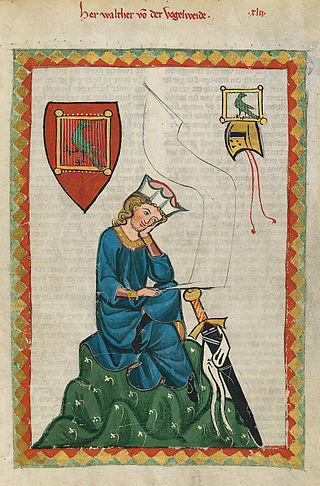Related Research Articles

The Codex Manesse is a Liederhandschrift, the single most comprehensive source of Middle High German Minnesang poetry, written and illustrated between c. 1304 when the main part was completed, and c. 1340 with the addenda.

Minnesang was a tradition of lyric- and song-writing in Germany and Austria that flourished in the Middle High German period. This period of medieval German literature began in the 12th century and continued into the 14th. People who wrote and performed Minnesang were known as Minnesänger, and a single song was called a Minnelied.
The Dial was an American magazine published intermittently from 1840 to 1929. In its first form, from 1840 to 1844, it served as the chief publication of the Transcendentalists. From the 1880s to 1919 it was revived as a political review and literary criticism magazine. From 1920 to 1929 it was an influential outlet for modernist literature in English. In January 2023, The Dial was revived once again as a magazine of international writing and reporting.
Alexander of St Albans, said to have been known by the surnames of Cementarius or le Pargiter, was an English ecclesiastic of the thirteenth century. He was first a Benedictine monk of the monastery of St. Augustine, at Canterbury, of which house he was made abbot in 1213. He was distinguished by his steady adherence to King John, who sent him in Rome to protest Pope Innocent III. He was excommunicated by Legate Pandulph after the death of the king, and he was deprived of his clerical station. He died in great poverty about the year 1220, though some place his death in 1217. He wrote several works, which are enumerated by Tanner.

Henry V of Brunswick-Wolfenbüttel, called the Younger,, a member of the House of Welf, was Duke of Brunswick-Lüneburg and ruling Prince of Brunswick-Wolfenbüttel from 1514 until his death. The last Catholic of the Welf princes, he was known for the large number of wars in which he was involved and for the long-standing affair with his mistress Eva von Trott.
Nationality words link to articles with information on the nation's poetry or literature.
— words chiselled onto the tombstone of John Keats, at his request
Nationality words link to articles with information on the nation's poetry or literature.
Nationality words link to articles with information on the nation's poetry or literature.
Nationality words link to articles with information on the nation's poetry or literature.
Nationality words link to articles with information on the nation's poetry or literature.

Nationality words link to articles with information on the nation's poetry or literature.
Henry Bate or Hendrik Baten a.k.a. Henricus Batenus (Mechliniensis) was a Flemish philosopher, theologian, astronomer, astrologer, poet, and musician.
John of Avranches was bishop of Avranches from 1060 to 1067, and archbishop of Rouen from 1067 to 1079. He was a Norman churchman, son of Rodulf of Ivry, and brother of Hugh of Bayeux. He appears in the Gesta Normannorum Ducum of William of Jumièges, and may have been one of the sources William used.
Nationality words link to articles with information on the nation's poetry or literature.
Der arme Heinrich is a Middle High German narrative poem by Hartmann von Aue. It was probably written in the 1190s and was the second to last of Hartmann's four epic works. Combining courtly and religious narrative patterns, it tells the story of a noble knight who has been stricken by God with leprosy and can be cured only by the heart's blood of a virgin who willingly sacrifices herself for his salvation.
Leonard Cox was an English humanist, author of the first book in English on rhetoric. He was a scholar of international reputation who found patronage in Poland, and was friend of Erasmus and Melanchthon. He was known to contemporaries as a grammarian, rhetorician, poet, and preacher, and was skilled in the modern as well as the classical languages.
Henricus is a given name. People with the name include:

Rolandus was a cardinal of the Roman Catholic Church. He was a native of Pisa, not Siena or Brittany. He was elected archbishop of Dol, but was not consecrated for five years, due to the opposition his metropolitan, the archbishop of Tours. Before he became a cardinal, he was sent by Pope Lucius III as his representative to Scotland to attempt to resolve a dispute over episcopal elections, involving the king.
References
- John Paul Heironimus and Josiah Cox Russell, editors (1929), Two types of thirteenth century grammatical poems
- John Paul Heironimus and Josiah Cox Russell, editors (1935), The Shorter Latin Poems of Master Henry of Avranches
- Papers of Konrad Bund